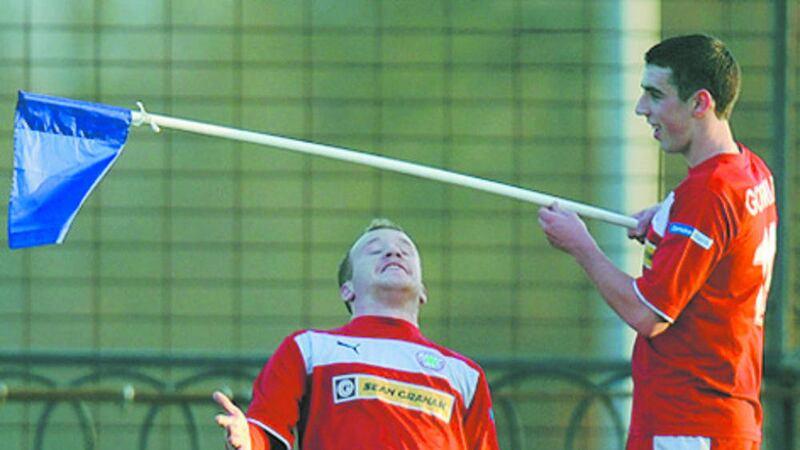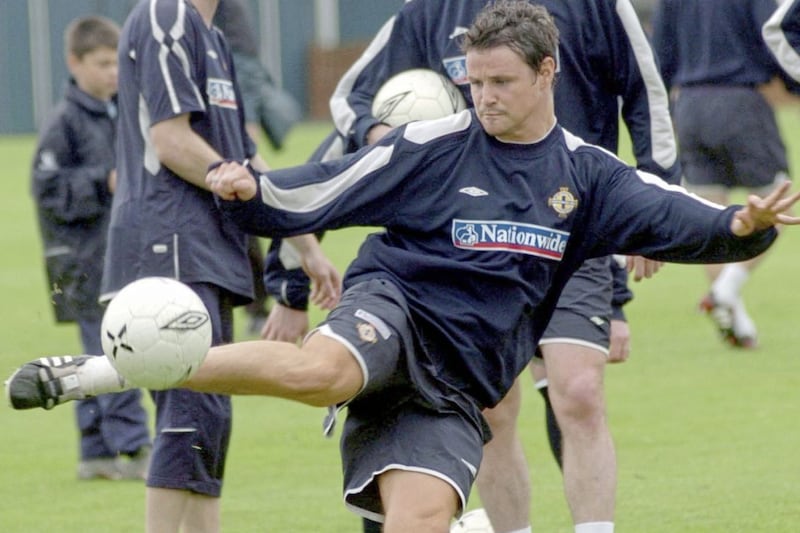HE arrives dressed in white robes, with a rosary of wooden beads around his waist and a crucifix at his hip.
Of course he does, you realize quickly, mentally chastising yourself: He’s hardly going to show up in a tracksuit, is he?
What do I call him? Phil? Philip? Mr Mulryne? Father Phil? Father Mulryne?
Of course, you call him Father Mulryne.
I shake the hand of the footballer-turned-priest. I think I called him ‘Father Phil’ but he doesn’t bat an eyelid.
He smiles and chats, comfortable among the people. An elderly lady in a wheelchair bows her head for a blessing, he shoots the breeze with some of his old teachers from De La Salle. Then a teenager gets some advice on his move to professional football.
They have all come to Lowe Church on the Upper Lisburn Road to talk about Fr Mulryne’s remarkable journey from Man United to Man of the Cloth.
You gotta have faith and faith was always there; a light that couldn’t be put out.
His mother taught him the prayers at their family home in Creeslough Park, Lenadoon that he whispered in darkness under the covers in his Manchester United digs.
Later, in his Norwich City bachelor pad with his Ferrari parked outside in the drive, the glamour of the footballers’ life almost drowned out those whispers.
The goals, the girls, the roar of the crowd, champagne corks popping… Fr Mulryne lived what we think (and he thought) was ‘the dream’ but despite all the VIP nightclubs, designer clobber and cars, by the age of 29 he was a restless soul, unfulfilled and searching for something more.
But that doesn’t mean he didn’t enjoy his time. Not at all, he loved it and he’s not here to give a poacher-turned-gamekeeper lecture about repentance and hell fire.
This man has lived and laughed and loved like the rest of us and isn’t that the perfect preparation for life as a Dominican Friar?
In childhood, Phil Mulryne played soccer for west Belfast’s St Oliver Plunkett FC nursery, Gaelic football and hurling for his club Lamh Dhearg and all three for La Salle.
Despite being been judged not quite excellent enough for the Manchester United School of Excellence as a youngster, he lit up the 1992 Milk playing for Antrim Town.
He ran the show in a game against Man United in that tournament and, next thing he knew, four clubs were chasing him.
“I had to choose between Liverpool, Man United, Millwall and Southampton but I was a huge Man United fan, so as soon as they came in I signed a schoolboy contract at the age of 14,” he explains.
He left Lenadoon for Manchester as a 16-year-old and was installed in digs with Keith Gillespie and Robbie Savage. It was, then, the answer to his prayers.
“As far back as I can remember, I wanted to be a footballer,” he said.
“My dad played in the Irish League and football was the only thing I thought of to make a life for myself, so to get that breakthrough was amazing.
“The first year was great craic and great banter but, being a homebird, I found it quite difficult. Then I came home for Christmas and realized I wasn’t missing anything so I went back and I never looked back.”
At Old Trafford he was in the class of ’94, one of a clutch of young hopefuls following in the already sizeable footsteps of the now famous ‘Class of ’92’ that had included Beckham, Scholes, Nicky Butt and the Neville brothers.
“They were in the reserves and starting to break through into the first team when I went over,” he recalls.
“Back then we had to clean the boots of the first team players and clean the changingrooms and you were the last to leave at five o’clock. Well, Alex Ferguson would be the last to leave. He would come down and check every room at the training ground. Once he gave the go-ahead that everything was done well, you could go home.”
I wonder if Jose Mourinho inspected the changingrooms during his time at the Cliff? Somehow I doubt it.
Young Mulryne admits he was on the end of a few “lashings” from Ferguson during his four years at Man U but he has only respect for a man who never forgot his own working class roots.
“He was always very fair with me,” he says.
“He was an excellent psychologist; he knew exactly which player needed what. He knew that if he shouted at Roy Keane, Roy would respond – ‘I’ll show you’ - but he dealt with people like Ryan Giggs or David Beckham, who were more quiet in their temperament, differently.
“I was on the end of a few lashings from him too! But he did that just to see how you would react.”
The class of ’94 matched the achievements of their predecessors by winning the FA Youth Cup in 1995. Ferguson pushed and prodded him psychologically off the pitch while Roy Keane ripped into him physically on it.
Training games were played with ferocious intensity and ‘Keano’ set the tone in a sink-or-swim environment.
“I always got on great with Roy,” he says.
“He was tough and he had this single-mindedness that I hadn’t seen in any other player. In training he’d be whacking you, the training sessions were like Premier League games – it was unbelievable.
“His whole point was: ‘Are you ready for the first team?’ He was putting you through the ringer. His demands, his ideals were so high and I think that’s the cause of some of the issues he’s had as a manager because he is so idealistic, his standards are so high and when he sees players falling below them, well, he can’t have that. He wants the best but I always got on well with him and he was good to all the Irish players.”
Keano was the heart but Paul Scholes was the art of that United side. The ginger haired genius was a footballing thoroughbred and Mulryne rates him as the best he played with, or against.
“No-one gets near Paul Scholes for me,” he says.
“Apart from him, the best I’ve played against as a central midfield player were Xavi (Barcelona) and Steven Gerrard, for Liverpool.
“My experience of Xavi was playing against Spain for Northern Ireland in Seville. Nigel Worthington (the manager) told me: ‘Just man-mark Xavi. Don’t do anything else, just man-mark him’. We were still very much in 4-4-2 mode and in the first five minutes he was dropping into left-back, then he was over on the right wing…
“I didn’t know what was going on. It was just a lesson.”
He’d made his Northern Ireland debut before he’d even started a game for United. In 1997, at the tender age of 19, Bryan Hamilton gave him a first taste of international action against Belgium at Windsor Park and he displayed his precocious talent in word and deed.
“I just remember not being nervous at all, which was really strange,” he says.
“I just couldn’t wait to get on. I can’t remember the goal much, I just remember jumping, there was a massive right back and I think I jumped on his shoulders.
“What I remember most is getting brought down for a penalty and then grabbing the ball, wanting to take it.
“I was saying: ‘I’m taking it, I’m taking it’ but Jim Magilton grabbed the ball off me. He was like: ‘Gimme the fffff…’
“I went back to Manchester the next day for training, I was training with the first team at that stage, and I felt great – back from international duty and I’d scored a goal… All the first team players were congratulating me, it was a great feeling.”
He had to say goodbye to Keano and the rest of them at the age of 20. His single Premier League appearance for United came in the 1997/98 season when he played the entire game against Barnsley in midfield.
But chances were few and far between the following year. He played two games in the League Cup but United successfully chased a League, FA Cup and Champions League treble and, after a sit down with Ferguson, Mulryne decided to move on.
“Alex Ferguson was very fair and he always treated me very well,” he says.
“He gave me a chance and then was honest enough to say ‘I’d like to give you more chances but the team is so extraordinary at the minute I can’t promise you’ll play, you’re going to have to wait for your turn’.
“When I turned 20, I had to make a decision and make a career for myself and move on.”
Northern Ireland manager Hamilton was the assistant-manager at Championship outfit Norwich City and he helped broker a half-a-million pound move for the midfield playmaker. He was guaranteed first team football and his mother Lily got to meet club chairman and celebratory cook Delia Smith.
“My mum and dad met the players at Man Utd and my mum would have been ‘yeah, whatever’ but when she met Delia Smith… She was a bit in awe,” he recalls with a laugh.
Mulryne hit the ground running at Carrow Road with a stunning free kick in his second game but broke his leg in two places in a tackle against Blackburn the following season.
He recovered and was a fixture in midfield as Norwich reached the play-off final and he’d almost sent the side to the Premier League with a dipping free-kick in extra-time but missed a penalty in the shoot-out and Birmingham City reached the promised land instead.
Two years’ later, Norwich won the Championship and Mulryne was back in the top flight but he admits that injuries and his lifestyle off the pitch had taken their toll.
“I was young at Man United and living in digs so it wasn’t until I got to Norwich that I started to experience the life of a footballer and all the trappings that go with it,” he says.
“Even as a youngster, I liked being out with the boys and, as a single man at Norwich, I had a lot of time on my hands and you fill that time with different things. I enjoyed the life off the pitch a bit too much.
“When you’re young you can deal with that because you’re so fit but it does catch up on you in your late 20s if you take it to extremes. We were successful at Norwich, we were winning and we were going out as a team a couple of times a week.
“Unless you have a sound head and are really grounded, the life can really take over and you can lose yourself in it.”
The leg break earlier in his career contributed to a series of serious hamstring injuries and a pattern emerged. He would battle back to fitness, then break down, then get back on the pitch only to pull up again.
He left for Cardiff City but, at 27, it seemed his best days on the field were behind him. He was still having great nights though and regards “getting thrown out of the Northern Ireland team for breaking a curfew” after he went out on the town in Belfast with Jeff Whitley as the low point of his career.
“That wasn’t a moment of pride for me,” he says with a wry smile and shake of his head.
“But I learned a lot from it, it was a turning point.”
After Cardiff he switched briefly to Major League Soccer in the USA and signed for San Jose but another hamstring injury left him at a crossroads. Disillusioned and bitterly disappointed, he craved the sanctuary of home and booked a flight to Belfast.
“I came home with the intention of going back to England, getting another club and getting fit again but it was that year that everything changed,” he says.
“I worked in a homeless shelter in Castle Street, joined The Legion of Mary and started going to Mass regularly and read more about why we believe what we believe, not just accepting it. What is the meaning behind the teachings of the faith and the gospels? I found it enriching and I had a sense of contentment for the first time because the football lifestyle was very restless, nothing was ever enough and I was never fully happy, I was always getting lots of pleasure but there was a restlessness within me.
“I found that practicing my faith and working in the homeless centre left me going home at night so content with a sense of peace.
“I had a real sense of fulfillment for the first time that I wasn’t just a footballer, there was more to life.”
Chapter one was over. Chapter two had already been written…





